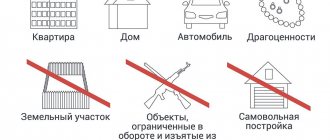Draws: Anastasia Asfandiyarova
According to Rosreestr statistics, in the first half of 2022, Russian courts considered more than 980 claims for the recovery of property from the illegal possession of another owner, with 267 claims related to the recovery of housing. But the courts are reluctant to satisfy such claims; in 74 applications, the claims were fully satisfied.
A statement of claim for the recovery of property from someone else’s illegal possession is a tool for protecting the property rights of the owner. In this article we tell you where to file such a claim and for what situations it is suitable.
Types of illegal possession of property
The Civil Code in Articles 301 and 302 identifies a number of situations with illegal possession of property.
- The theft from the owner of property as a result of theft or fraud that transfers title to the property to a third party without any authority to own it.
- The owner lost the property, and then third parties claimed rights to it without obtaining consent from the owner. In this case, the previous owner still owns the property, and the law recognizes the new owner's possession as illegal.
- Rights to property were obtained by third parties as a result of deception or threats when concluding a transaction with property. Typically, such situations arise in residential transactions, but can also concern other property.
In addition, illegal possession is recognized as:
- If the legal owner has all the evidence that the disputed property really belongs to him. For real estate, this will be an extract from the Unified State Register of Real Estate.
- The owner will prove that he lost the property without his consent as a result of theft, loss, threats or deception, as well as fraud.
- The property is in the possession of the illegal owner at the time the lawsuit is filed.
Appropriation of state property
When qualifying actions to appropriate someone else's property committed by officials, the position held plays a special role.
For example, if the appropriation of an item that is in a laboratory or warehouse was made by a warehouse worker or laboratory assistant, difficulties usually arise in qualifying his actions.
The situation becomes more complicated if the crime was committed by the head of the organization, since he has a wider range of powers with which he can legalize his actions.
For example, a manager may enter into a fictitious agreement in order to sell the property he is interested in to a predetermined counterparty. The external legal nature of the transaction should not serve as a basis for exemption from liability.
If an official is found guilty of these actions, he is given a punishment, the upper limit of which is seven years in prison. In case of abuse of official powers, in accordance with Article 285 of the Criminal Code of the Russian Federation, the specified period is increased to ten years in prison.
In what cases can property be reclaimed from illegal possession?
The former owner can demand that the illegal owner return the property only if he points out signs by which he can be identified. For example, these could be:
- Availability of serial numbers and other marks from the manufacturer;
- Numbers put on the balance sheet by the company during the inventory;
- Other property markings or identification marks.
If the new owner has lost the property as a result of destruction or the identification marks on it have been erased and identification cannot be carried out, then the court will not accept the statement of claim, and it is impossible to reclaim the property from illegal possession. However, the legal owner may demand compensation for the damage caused to him or demand compensation for unjust enrichment.
Report to the police regarding the seizure of property
The most interesting question is: are there really no signs of arbitrariness in this situation? and the second point - is the district police officer obliged, during an inspection based on an application, to interview the guilty person? He is hiding at his registration address; in the application I indicated the coordinates of his work and other place of residence.
Thank you very much, dear lawyers - you help with theory :) Another point - does the district police officer have a deadline for making a decision - 3 (10) days - if he does not have time to interview the person during this time (because he is hiding)? Is it possible to refuse to initiate a case simply because the situation does not fit any article of the Criminal Code? PS I’ll explain the interest - the person is also hiding with an outstanding debt on the receipt. But I submitted an application only for property. With debt, I understand that I need to go straight to court.
I filed a statement with the police regarding the retention of my property in the apartment of another person.
The specified person acknowledges by email that he has the property. I have receipts for this property. At the moment the person is hiding and is not returning the property. The district police officer said that this was not a crime and he would refuse to initiate a case. The question is: will the refusal be legal if the detaining person is not at least questioned? Is there any arbitrariness here (on the part of the person) We need to look for all the documents. If you still have to write such agreements to the court.
And accordingly, you can go to court with a claim for the division of real estate. All the best. Lawyer Zotov V. I. Petrozavodsk, since the lease agreement was not legally concluded, the retention of property is clearly illegal. the initiation of a criminal case was rightfully refused, since this is an economic dispute and it must be resolved in court. Sincerely, Profi Yu. B. LLC. Legal assistance to citizens and organizations. Free departure... Tel. 8-916-676-82-79, El. mail:
Claim procedure
The pre-trial or claim procedure for resolving a dispute with an illegal owner is valid if this condition is specified in the agreement on the basis of which the illegal owner received the property. For example, if a claim is filed regarding company property, then a pre-trial claim must first be filed. If the illegal owner does not respond to it within 30 calendar days, then the statement of claim is filed with the arbitration court.
However, the legislation does not provide for an obligation in cases of reclaiming property from someone else’s illegal possession. The court may consider compliance with such a requirement by analogy with a claim for the return of unjust enrichment. At the same time, Article 303 on settlements when returning property from illegal possession should be taken into account in priority over the general rules on the return of unjust enrichment, as stated in paragraph 12 in the resolution of the Plenum of the Supreme Arbitration Court of the Russian Federation dated November 17, 2011 No. 73, the Presidium of the Supreme Arbitration Court of the Russian Federation dated April 6, 2004 No. 15828/03. Interest on income from illegal possession of someone else's property in this case should not be accrued. The courts proceed from the fact that illegal possession of a thing is the unjust use of property, not income, and they will not apply Article 395 in this case.
Definition
Any misappropriation of someone else's property from the point of view of the law is its retention. One common example is the refusal of the tenant of an apartment to vacate after the expiration of the lease.
The retention of property becomes illegal if two factors are present:
- Absence of a document giving the right to retain this property (lease agreement, bank loan, etc.).
- The owner of the thing has no debts to the citizen holding it.
Once a person has illegally taken possession of property and denied access to its rightful owner, the crime is considered completed.
However, it must be taken into account that the law allows some situations of withholding someone else’s property. They concern the relationship between debtor and creditor. If the borrower does not repay the money on time, the lender has the right to retain his property until the debt is paid.
This rule also applies if the tenant does not pay the rent. The owner of the apartment has the right to keep his things until the debt is repaid.
At the same time, it is not always possible to accurately establish the boundary between legal and illegal retention of property, so it is important to correctly assess the situation so as not to break the law yourself.
Lawsuit
You can protect the violated rights of the owner to own property by filing a vindication claim.
A vindication claim is a demand from the legal owner to return his property, which was taken by other persons without the consent of the previous owner. As part of the trial, the new owner must prove that he can legally own the thing or real estate and confirm the fact of a transaction or other transfer of the disputed property to him. If the old owner wants to regain the property, he must prove the illegality of possession by the new owner.
A vindication claim differs from a negatory claim. Both claims are aimed at restoring the rights of the owner, but there are differences:
- The negative is filed when the property is in the possession of the owner. A vindication claim concerns the recovery of property from someone else’s illegal possession;
- A negative claim resolves problems regarding the right to use or dispose of property; a vindication claim is filed only if there are disputes regarding ownership;
- Such claims also differ in terms of statute of limitations. If a vindication claim is filed within three years after the violation of the rights to own property, then a negatory claim can be filed at any time when the owner learns of the violation of the rights of use and disposal.
The owner can file a statement of claim in relation to any property – real and movable. It is necessary to attach title documents for the disputed property to the application, otherwise the case is unlikely to be considered. Such documents may be:
- An extract from the Unified State Register of Real Estate, if the application is submitted in relation to real estate, or a certificate of registration of property rights (if the premises were registered before 2022);
- Contracts of purchase and sale, donation, exchange;
- Will.
How to distinguish embezzlement from embezzlement or theft?
When investigating criminal cases, the qualification of the crime is of particular importance, including the correct distinction between different types of theft. According to the provisions of the Criminal Code of the Russian Federation, crimes against property include theft, robbery, robbery, arbitrariness, misappropriation, embezzlement, etc. The distinction between these methods of theft is made depending on the nature of the criminal’s behavior:
- violent actions or the threat of violence during the seizure of property accompany robbery, robbery, and in some cases theft;
- misappropriation, embezzlement or fraud occurs without the use of violence.
Misappropriation and embezzlement are included by the legislator in the content of one article 160 of the Criminal Code of the Russian Federation. This is due to a similar procedure for receiving property by the guilty person - it was legally entrusted to them by the owner.
Unlike embezzlement, theft is the secret taking of any type of property. In most cases, the owner may not even know about illegal actions until he discovers the loss. Embezzlement is preceded by the voluntary transfer of assets or money to another person, and illegality of actions can arise after a certain period of time.
The difference between embezzlement and embezzlement lies in the nature of the illegal actions with the entrusted property. Appropriation occurs by making the ownership and use of property legal (for example, by using false documents to register ownership of real estate). Embezzlement is characterized by its use, expenditure or alienation, as a result of which the offender receives a benefit. Despite the different nature of criminal acts, the punishment for misappropriation and embezzlement is the same.
Court
In court, the plaintiff must state:
- On the return of all income received from illegal possession of property, or compensation of income that the owner could have received when owning the thing for the period during which the property was in illegal possession;
- On the return of income from a bona fide owner. The income must be received from the moment when the bona fide owner became aware of his illegal possession. The plaintiff may also request compensation for lost profits during the period of illegal possession.
But the Civil Code also protects the bona fide owner. In response to the claim, he may demand compensation for the maintenance of the property for the period for which the income from the property was calculated. However, the expenses must be justified; they must really improve the characteristics of the property or add new functions to it.
In addition, if improvements can be separated from the thing, then the bona fide owner can keep them or demand compensation if separation is impossible. The amount of compensation should not exceed the amount of improvements made.
The statement of claim is filed with the court at the location of the defendant, that is, the bona fide or dishonest owner. The limitation period during which the court can accept the application for consideration is three years. This period begins to run from the moment:
- When the previous owner learned about the violation of his rights to property;
- When the previous owner found out the exact location and new owner of the lost item.
The state fee when filing a claim is paid by the plaintiff. Its size is calculated based on the value of the disputed property.
For example, the state duty for a claim for the return of real estate will be calculated based on its cadastral value. And the duty for movable property will be calculated based on its value indicated on the documents when purchasing the item. If the property has already lost its marketable appearance, then to assess the value you need to order an expert assessment from appraisers.
The plaintiff can return the court costs if the claim is fully satisfied, and if the case is partially won, then the state fee can be returned in proportion to the requirements that the court satisfied. If the court rejects the claim, then the state fee is not returned.
Responsibility for a crime and misdemeanor for retaining someone else's property
The punishment for appropriation of someone else's property may be as follows:
- a fine of up to 120,000 rubles;
- compulsory work up to 240 hours;
- correctional labor for up to six months;
- restriction of freedom, forced labor or imprisonment - up to 2 years.
Aggravating circumstances are:
- commission of a crime by several previously agreed persons, with damage exceeding 2,500 rubles;
- abuse of official position, with damage exceeding 250,000 rubles;
- the crime was committed by a group, damage in the amount of more than 1,000,000 rubles.
The punishment in these cases will be as follows:
- Fine - up to 500,000 rubles or the perpetrator’s earnings for a period of up to 3 years, depending on the severity of the violation.
- Mandatory work lasting up to 360 hours.
- Correctional labor for up to a year.
- Forced labor for a period of up to 5 years with possible restriction of freedom from 1 to 1.5 years.
- Imprisonment for a term of 5, 6 and 10 years, proportional to the severity of the act committed, with an additional penalty in the form of restriction of freedom for up to 1, 1.5 and 2 years, respectively, and a fine of 10,000 rubles.
Arbitrariness under criminal law is punishable by:
- a fine of up to 80,000 rubles or in the amount of the offender’s income for six months; or
- compulsory work no more than 480 hours; or
- correctional labor for no more than 2 years; or
- arrest for a period of not more than 6 months.
If a similar act was combined with violence or threats to use it, the sanctions are increased to 5 years of forced labor, or up to six months of arrest, or up to 5 years in prison.
As an administrative offense, arbitrariness, i.e., retention of someone else's property (Article 19.1 of the Administrative Code), is punishable by a warning or a fine in the amount of 100 to 300 rubles for citizens and from 300 to 500 rubles for officials.
The court's decision
There are situations when the court's decision when considering a case on the recovery of property from illegal possession will be negative. The owner will definitely lose the claim; if the property is destroyed, there is nothing left to claim. An owner may be recognized as an unscrupulous owner if he:
- Quickly resold the item;
- Sold it at a price below the market price;
- Depends on the buyer's decision.
The court recognizes such transactions as invalid. As a result, the buyer must return the item to the owner, and the contract is terminated.
The Supreme and Supreme Arbitration Court, in a joint Resolution of the Plenums of April 29, 2010 No. 10/22, explained that if the property is not registered in the Unified State Register of Real Estate under the previous owner, the buyer may be considered dishonest. If the acquirer has managed to register other people in the real estate, then he must write them out from there. Finally, if the buyer refuses to comply with the approved court decision, then the plaintiff needs to obtain a writ of execution and contact the bailiffs, who will forcibly evict the buyer and his family members from someone else’s property.
The buyer is also recognized as a bona fide buyer if the item was purchased on a reimbursable basis. If the transaction was gratuitous, then the new owner returns the property to the previous, legal owner of the thing, regardless of how the property was acquired.
The buyer must prove that the property was transferred to him at the will of the previous owner. But if the property was seized by a court decision, which was subsequently overturned, then the court recognizes the transfer of property against the will of the owner.
When considering a case, the court checks the legality of the owner’s powers, and if the lower court made a mistake in determining the legality, then the higher authority must send the case for a new trial.
Article 19.1 of the Code of Administrative Offenses of the Russian Federation
Within the framework of administrative liability for unlawful retention of someone else’s property, the following is provided:
- Warning.
- A fine of 100-300 rubles for citizens and 300-500 rubles for officials.
However, it must be taken into account that, like other offenses, unlawful retention of someone else’s property can be classified taking into account aggravating circumstances.
Have a question for a lawyer? Ask now, call and get a free consultation from leading lawyers in your city. We will answer your questions quickly and try to help with your specific case.
Telephone in Moscow and the Moscow region: +7
Phone in St. Petersburg and Leningrad region: +7
Free hotline throughout Russia: 8 (800) 301-39-20
Who is considered a bona fide owner?
From January 1, 2022, bona fide owners will be paid compensation for money spent on property that was seized from illegal possession. To do this, it is necessary that the purchaser of the property be recognized as bona fide - such an owner does not and cannot know that the seller acquired the property being sold illegally and should not be its owner. A bona fide purchaser must prove that reasonable care and diligence was exercised when completing the transaction. He must prove that he was able to check the counterparty to the transaction and he had no doubts about the honesty of the seller. A conscientious buyer must rely on data from official registers and not be aware of fraudulent activities with property.
According to general rules, a bona fide buyer should not be deprived of purchased property for which the new owner paid the actual price. But the legislation provides for norms according to which the seller or the previous owner can reclaim property from illegal possession.
Bailiffs do not have the right to the family's subsistence level (Perezaliv)
Sample statement to the police about neighbors making noise at night? If the lender has all the necessary documents, then such actions will be absolutely legal. The criminal act of illegal appropriation of someone else’s real estate is characterized by the following aspects:
- The property was temporarily transferred to a third party for safekeeping.
- The opponent receives benefit and profit from the fact that he holds other people’s material assets.
- When an attacker provides material benefits to his counterparties, he does not indicate that he is not the actual owner of the assets.
Reclaiming property from a bona fide owner
The acquired property will be taken away from a bona fide owner at the request of the previous owner in several cases:
- The thing left the possession of the legal owner against their will, for example, due to malicious intent, theft, loss, or other interference of third parties in ownership.
- The property was purchased from a seller who had no authority to sell. For example, a power of attorney to complete a transaction was not issued, or an agency agreement was not signed.
Recent changes to the Civil Code provide broader protection for the rights of a bona fide purchaser, and he can now count on compensation for losses when purchasing property from an illegal owner. So, if within six months a bona fide purchaser has not received compensation for losses under the writ of execution, then he is paid a one-time lump sum compensation at public expense.
The amount of such compensation is determined by the court in each specific situation. For example, if we are talking about the purchase of housing, then he can be paid either the value of the property under the purchase and sale agreement, or at the cadastral value of the claimed property, which is determined on the date of entry into force of the judicial act on compensation for expenses incurred.
If during the enforcement proceedings the acquirer was able to partially compensate for the losses, the compensation will be reduced by the amount of expenses already collected.
After payment of compensation, the state will have the right to recover expenses from the illegal seller of real estate, which will demand the return of the amount of expenses spent on compensation to the bona fide purchaser.
Courts, Real estate
Save:
Illegal retention of someone else's property as a crime and administrative offense
The Criminal Code contains 2 offenses that can be classified as illegal retention of someone else's property.
- Misappropriation (Article 160 of the Criminal Code of the Russian Federation) is characterized as free, illegal conversion by a criminal of material goods entrusted to him for his own benefit, committed for selfish interests, without the owner’s order to do so. Thus, in order for the retention of someone else’s property to qualify as misappropriation, the following signs must be present:
- property entrusted for safekeeping;
- there is self-interest in the actions of the detainee;
- there are no instructions from the owner of the thing to conceal it.
- Arbitrariness (Article 330 of the Criminal Code of the Russian Federation) is the willful commission of any actions that are contrary to the established norms of the law or other legislative acts, the legality of which is questioned by an organization or citizen, if such behavior has caused significant harm. The most striking and common example of such a crime is the obstruction of one co-owner from another from living on the property, contrary to a court decision or available documents.
Of course, for such actions to be qualified under the Criminal Code, the consequences must be significant. But whether the harm is significant is determined in each specific case individually. The law does not clearly define substantial harm.
Arbitrariness within the framework of administrative legislation (Article 19.1 of the Code of Administrative Offenses of the Russian Federation) is defined almost identically to the concept from criminal law, but with one significant difference. If the above actions did not cause significant harm to the injured party, then the committed action is classified not as a crime, but as an administrative violation, the punishment for which is much milder.
Difference between kidnapping and deprivation of liberty
How does kidnapping differ from unlawful deprivation of liberty, except for the article number in the Criminal Code?
The differences are actually quite significant if you study the law:
- Various preventive measures for crimes.
- Methods of execution.
- Circumstances surrounding the act.
- In abduction, the location of the victim is changed by force, while incarceration uses the environment in which she arrived voluntarily.
- The motives for deprivation of liberty will not be taken into account, while in order to kidnap, intent plays a vital role and often becomes an aggravating circumstance.
In conclusion, we note that illegal restriction of freedom, as well as the kidnapping of a citizen, are strictly punishable by law. The concepts of human freedom and his rights are carefully protected by the state and the law.
Theft is always associated with other offenses, after which it is necessary to correctly qualify the act in all parts. Resolving this issue involves taking into account the facts of the use of violence and its consequences for the health of the victim. If such actions cause harm to health or death, then this entails aggravating circumstances.
Deprivation or restriction of freedom is always aimed at a person’s personality. It is not associated with the abduction of the victim, but restricts his movement and communication with the outside world. Therefore, it is necessary to establish a distinction between kidnapping and unlawful deprivation of liberty. Confrontation is the main factor that has a negative impact on the situation with these illegal acts.
These factors are of different nature:
- Social.
- Political.
- Religious.
The relationship between the value of a person and the number of crimes against him has always been inversely proportional. It’s sad but true that force is still used to achieve any goals, both at the level of human and at the level of interethnic relations.
If freedom is limited with the consent of a person, as well as placing him in conditions from which he is able to get out on his own in a short time, then there is no corpus delicti as such.
If there are circumstances that exclude a criminal component - necessary defense, causing harm during the detention of a criminal, an order or direct order, extreme necessity.
Prosecution of minors and mitigating circumstances
The question of whether children will be punished for theft and appropriation of other people's property is not so easy to answer. According to the law, responsibility for such actions begins at the age of 14. But in practice, children are very rarely punished for this. Usually only in situations with aggravating circumstances, repeat thefts, etc.
Under the article, they are not punished for embezzlement also because there are practically no such crimes involving children. The reason is simple - they are not trusted with monetary values and other property.
There are amendments to the Criminal Code that mitigate the liability of minors under 16 years of age. The court always carefully considers cases involving them and collects documents characterizing the teenager in order to assign the most lenient punishment. The only exceptions are cases when there are aggravating circumstances that require the perpetrator to be punished to the fullest extent of the law.
A mitigating circumstance is the age of the offender, who has not reached the age of majority. Pregnant women and women raising young children can also apply for mitigation.
Other mitigating circumstances include:
- Confession;
- Committing a crime under duress;
- Poor property situation.
How to return property
The law defines mandatory liability for the appropriation of another person's property. It does not matter who is the plaintiff - the lessor or the contractor. In any case, if there is evidence of a crime, the perpetrator will be punished, and the property will be returned to the rightful owner.
Often, in order to correctly draw up a claim and conduct a case, the services of a qualified lawyer are needed, since it is necessary to prove the fact of ownership of property and violation of the agreement on its use by the culprit.






